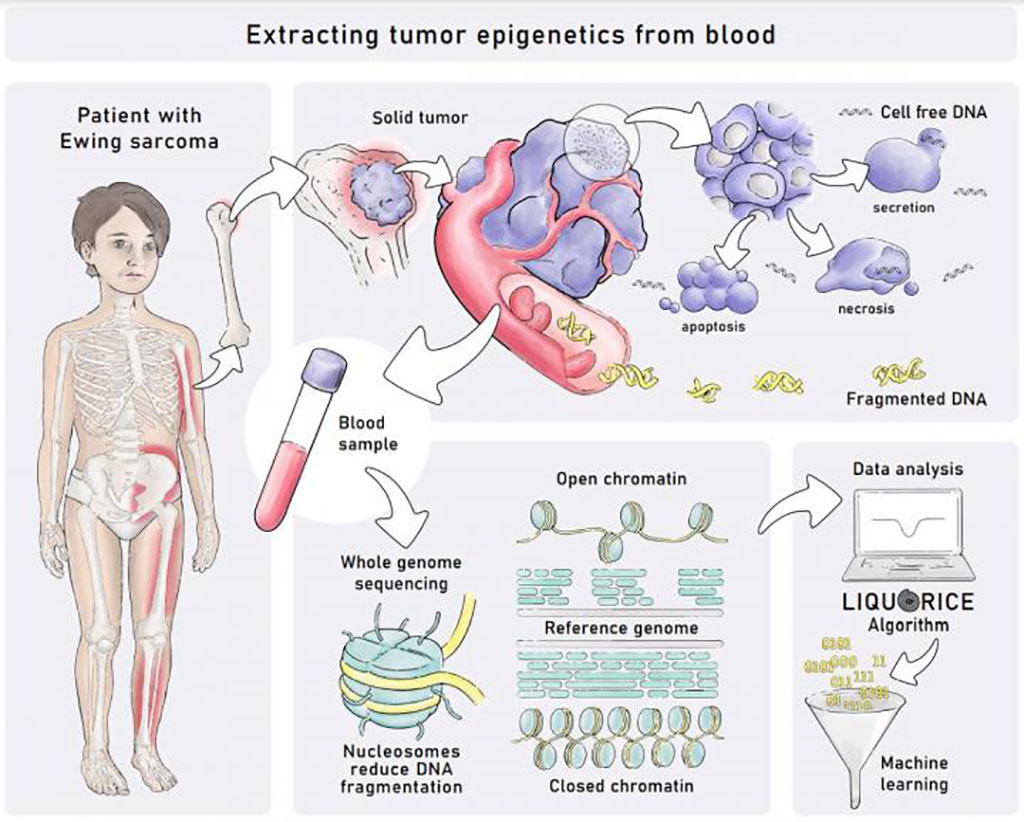A Novel Liquid Biopsy Technique for Diagnosis of Cancers in Children
By LabMedica International staff writers
Posted on 07 Jun 2021
A novel liquid biopsy technique for cancer diagnosis in pediatric patients detects and quantifies epigenetic signatures based on cell-free DNA (cfDNA) fragmentation patterns.Posted on 07 Jun 2021
Liquid biopsy analysis of circulating cfDNA from peripheral blood has emerged as a valuable diagnostic tool in oncology, since sample collection is quick and minimally invasive. In cancer patients, cfDNA consists in part of cancer-derived circulating tumor DNA (ctDNA), and it has been shown that tumor-related genetic and epigenetic alterations can be detected by analyzing cfDNA in cancer patients. As a consequence, cfDNA analysis holds great promise for precision oncology and personalized therapies, and is currently being evaluated in a broad range of clinical studies. However, the use of liquid biopsy for childhood cancers has so far been hampered by the fact that many childhood tumors have few genetic alterations that are detectable in cfDNA.

Image: Extracting tumor epigenetics from blood (Photo courtesy of Tatjana Hirschmugl)
To improve this situation, investigators at St. Anna Children's Cancer Research Institute (Vienna, Austria) introduced an integrated genetic/epigenetic analysis method and demonstrated its utility on 241 deep whole-genome sequencing profiles of 95 patients with Ewing sarcoma and 31 patients with other pediatric sarcomas. Ewing sarcoma is a type of cancer that may be a bone sarcoma or a soft-tissue sarcoma. Symptoms may include swelling and pain at the site of the tumor, fever, and a bone fracture. Ewing sarcoma occurs most often in teenagers and young adults and represents 2% of childhood cancers.
The method introduced in the current study was based on analysis of the fragmentation patterns of the small DNA fragments leaked by tumors into the blood stream, which reflected the unique epigenetic signature of many childhood cancers.
Results revealed that tumor DNA in the blood of patients with Ewing sarcoma was highly and characteristically fragmented. The investigators identified an Ewing sarcoma-specific epigenetic signature among regional fragmentation patterns across the genome, and presented a bioinformatic method for accurate quantification of these epigenetic signatures in cfDNA. Ultimately, they conducted one of the largest cfDNA sequencing studies for childhood cancer, resulting in a detailed genetic and epigenetic analysis of Ewing sarcoma tumors using liquid biopsies.
"We previously identified unique epigenetic signatures of Ewing sarcoma. We reasoned that these characteristic epigenetic signatures should be preserved in the fragmentation patterns of tumor-derived DNA circulating in the blood. This would provide us with a much-needed marker for early diagnosis and tumor classification using the liquid biopsy concept," said senior author Dr. Eleni Tomazou, principal investigator of the epigenome-based precision medicine group at St. Anna Children's Cancer Research Institute.
The current study unveiled the LIQUORICE algorithm for detecting circulating tumor DNA based on cancer-specific chromatin signatures. "By feeding these machine learning algorithms with our extensive whole genome sequencing data of tumor-derived DNA in the blood stream, the analysis becomes highly sensitive and in many instances outperforms conventional genetic analyses", said Dr. Tomazou. "Right now, most patients receive very high doses of chemotherapy, while some patients may be cured already with a less severe therapy, which would reduce their risk of getting other cancers later in life. There is a real medical need for adaptive clinical trials and personalized treatment of bone tumors in children."
The pediatric liquid biopsy study was published in the May 28, 2021, online edition of the journal Nature Communications.
Related Links:
St. Anna Children's Cancer Research Institute














